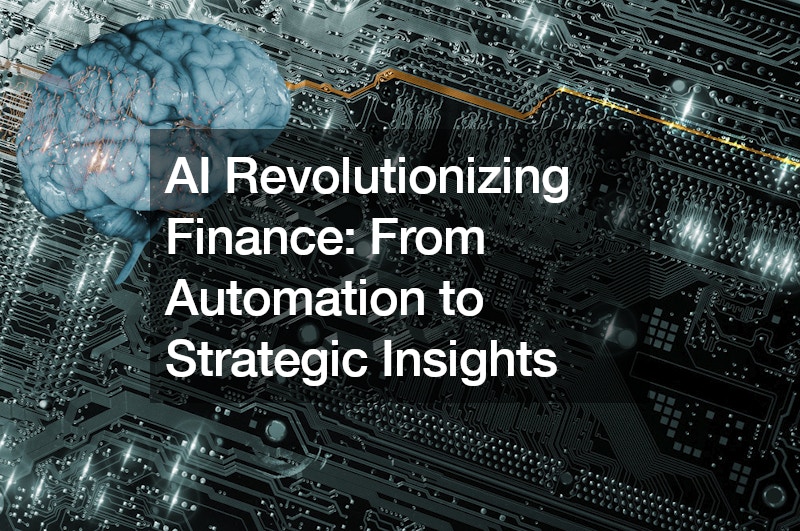
Artificial intelligence (AI) has become a pivotal force reshaping the landscape of finance and accounting. Its transformative impact spans from automating mundane tasks to providing strategic insights that revolutionize decision-making processes across the industry. Here’s a closer look at how AI is driving these changes:
Automation Redefining Operational Efficiency
The automation of labor-intensive tasks like data entry and reconciliation through AI has ushered in a new era of operational efficiency within the finance sector. Utilizing advanced machine learning algorithms, AI systems excel in processing extensive financial data swiftly and with exceptional precision. This automation not only minimizes the potential for human error but also liberates significant time for financial professionals.
They can now redirect their focus towards tasks of higher strategic value, such as financial analysis and decision-making.
For instance, modern journal entry software solutions leverage AI to streamline the input of transactional data, ensuring accuracy and efficiency in financial records. By analyzing historical patterns and transaction details, AI categorizes entries and reconciles accounts seamlessly, enhancing overall productivity and compliance with accounting standards. This integration illustrates AI’s role in optimizing financial operations, allowing professionals to allocate resources more strategically and drive superior organizational performance.
Predictive Analytics for Informed Decision-Making
AI’s prowess in predictive analytics stands as a cornerstone in modern finance. Through sophisticated analysis of historical data, AI not only identifies patterns but also forecasts market trends, enabling financial institutions to refine investment strategies and anticipate risks with unparalleled accuracy. This data-driven approach empowers decision-makers to navigate dynamic and competitive markets proactively. By leveraging AI-generated insights, organizations can optimize resource allocation, seize emerging opportunities, and achieve superior outcomes, reinforcing AI’s transformative impact on strategic decision-making in the finance industry.
Enhanced Risk Management and Compliance
AI has become essential for enhancing risk management and regulatory compliance in finance. Through real-time analysis of transactional data, AI algorithms swiftly identify and mitigate potential risks, including detecting fraudulent activities and flagging suspicious transactions. This proactive approach helps financial institutions minimize financial losses and uphold organizational integrity amid complex regulatory landscapes.
Furthermore, AI-driven automation transforms compliance monitoring and reporting. By analyzing extensive data sets systematically, AI ensures strict adherence to regulatory standards. Beyond detection, AI facilitates proactive compliance management by identifying emerging trends and regulatory changes.
Transforming Auditing Processes
The integration of AI-driven technologies has brought about a profound transformation in auditing practices within the financial sector. AI’s ability to automate data analysis and detect anomalies in financial statements has significantly enhanced the efficiency and accuracy of audits.
Traditionally, auditors spent substantial time manually reviewing extensive datasets to identify discrepancies and potential errors. With AI, this process is expedited and refined, as algorithms can swiftly analyze large volumes of data, flagging inconsistencies and anomalies that require further investigation. This automation not only accelerates audit timelines but also reduces the likelihood of oversight, ensuring that audits are conducted with greater thoroughness and precision.
Insights Driving Strategic Financial Analysis
AI’s transformative impact on financial analysis extends to its ability to derive actionable insights from complex datasets. By leveraging advanced algorithms, AI sifts through financial patterns, market trends, and consumer behavior data to unearth valuable insights. These insights empower financial professionals to make informed decisions, optimize resource allocation, and stay ahead in competitive markets. For instance, AI can analyze historical data to identify emerging market trends or consumer preferences, enabling organizations to pivot their strategies proactively.
Moreover, AI-driven analytics enhances the precision and depth of financial forecasting. By processing large volumes of data rapidly, AI generates predictive models that forecast market movements and identify potential risks. This predictive capability enables businesses to mitigate risks preemptively and capitalize on opportunities swiftly, driving sustainable growth and profitability.
Personalized Client Service and Innovation
AI not only enhances operational efficiencies but also revolutionizes client service by enabling financial professionals to deliver personalized experiences. With routine tasks automated, professionals can dedicate more time to understanding client needs and preferences. AI-powered insights provide a deeper understanding of client behaviors and financial goals, allowing advisors to offer tailored recommendations and strategies that align precisely with individual client objectives.
Furthermore, AI fuels innovation within the financial sector by fostering the development of new products and services. By analyzing vast datasets and market trends, AI identifies gaps in existing offerings and opportunities for innovation. For example, AI-powered chatbots can provide instant customer support, enhancing client engagement and satisfaction. Additionally, AI algorithms assist in the creation of sophisticated financial products that cater to evolving customer demands, such as personalized investment portfolios or risk management solutions.
Looking Ahead: The Future of AI in Finance
As AI continues its rapid evolution, its influence on finance and accounting will undoubtedly become more profound. Future advancements may include further integration of natural language processing to automate customer service interactions seamlessly. Additionally, AI’s synergy with blockchain technology promises enhanced security and transparency in financial transactions, transforming how businesses and individuals manage their financial assets.
Moreover, predictive analytics models powered by AI are poised to become even more sophisticated, offering deeper insights into market dynamics and risk factors. These advancements will empower financial professionals to make data-driven decisions with unprecedented accuracy and confidence.
Overall, the future of AI in finance holds immense potential to drive innovation, improve operational efficiency, and deliver enhanced value to stakeholders across the industry. As organizations embrace AI technologies, they will unlock new opportunities for growth and competitive differentiation in a rapidly evolving global economy.
Closing Thoughts
AI represents a paradigm shift in the finance and accounting industries, enabling organizations to achieve greater efficiency, accuracy, and innovation. By utilizing AI-powered technologies, financial institutions can overcome challenges, capitalize on emerging opportunities, and deliver superior value to clients in a rapidly evolving global economy. As AI continues to advance, its profound impact on finance promises to shape the future of the industry for years to come.
.

